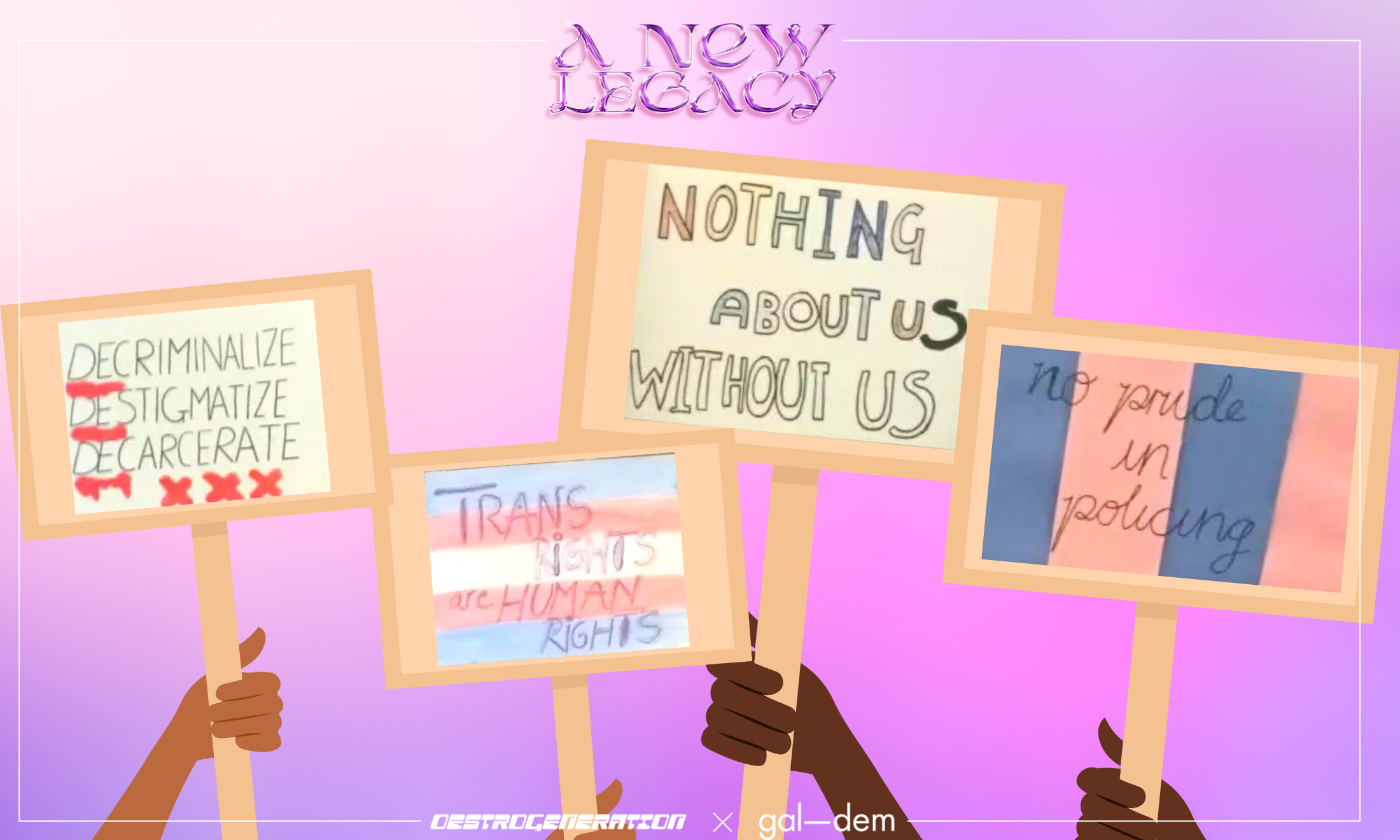Advocating for autonomy: trans and sex workers rights have always gone hand in hand
Historically, sex work has been an integral part of trans womanhood. Today fighting for trans liberation needs to include decriminalisation of sex work.
Fey Ameya Kapur and June Bellebono
17 Nov 2022

Protest signs courtesy of SWARM
This story is part of A new legacy — a collaboration between gal-dem and oestrogeneration platforming transfeminine writers of colour. Read more stories in the series here.
Trans sex workers have always battled against systems that are determined to punish them for the mere fact of their existence.
“Issues of identity, work and criminalisation have been intertwined since time immemorial,” TransActions, a UK-wide project working with trans people who sell sex aiming to better understand and thus better support their conditions, tells gal-dem.
Sex work can emerge as a response to issues the queer community are perennially familiar; namely, vagrancy, social exclusion and other structural inequalities. On the other hand, trans sex workers are not passive subjects.
“When I became a sex worker I could do things I like. I choose clients. I choose the men I want to see,” a participant in a focus group run by TransActions said, highlighting the multidimensional relationships trans women have with sex work, both historically and currently.
“I chose sex work in the constraints that I had. I chose to do it within [the] constraints of homelessness,” said another.
Trans people’s employment opportunities have long been limited. If we look back to groups like Vanguard, one of the earliest North American queer liberation organisations established in 1960s San Francisco, we can see how queer and trans young sex workers formed bonds of solidarity over this exclusion from both the job market and broader society.
Six decades on, and looking at the context worldwide, little has changed. In the US for example, a 2015 survey by the National Center for Transgender Equality conducted on more than 27,000 trans individuals (no survey of this size has ever been done in the UK) found unemployment rates for trans people are still three times higher than those of our cisgender counterparts. For trans women of colour in particular, who face the dual challenges of racism and sexism, sex work can sometimes provide the only option for work in a society that unfairly classes them as unskilled. Pair this with issues of objectification, where people’s perception of trans women is inherently sexualised, alongside extortionate transition costs, it is no surprise that the body often remains the most profitable commodity for transfeminine people.
An inescapable double bind
When precarious migrant status comes into the picture, the likelihood of engaging in sex work for a trans woman is even higher. Asylum seekers awaiting their claim result are currently not able to work in the UK, whilst receiving negligible financial support. Forcing people “even further underground can in turn lead to people making more risky decisions about how to earn the money they need to survive, or can impact access to medications and medical help,” says TransActions.
Even when they are able to legally work, holding insecure immigration status means that “trans migrant workers are increasingly susceptible to workplace exploitation, unfair wages, working conditions, and varying levels of abuse from their employers,” says Elizabeth George, from National Ugly Mugs (NUM), a UK-based charity fighting and advocating for the end of all forms of violence against sex workers. To be a migrant trans sex worker is to be placed precariously within an inescapable double bind: on the one hand it is often the only economically viable option, while on the other they are stigmatised for being placed in a social position that they did not ask for, in a cultural hegemony they are simply doing their best to survive in.
“To be a migrant trans sex worker is to be placed precariously within an inescapable double bind”
The consequence of living within a criminalised context is that trans migrant sex workers end up lacking any form of legal protection. “Targeted raids on migrant sex workers have been on the increase since Covid-19,” adds Elizabeth, who is the project coordinator on racial justice for sex workers at NUM. “When the police have the power to define the parameters of sexual exploitation within sex work, this is then used as a means to prosecute trans and migrant women for brothel keeping offences.” While the government claims to be “committed to tackling the harm and exploitation” that sex workers are known to endure, this fails to hold true as 86% of trans sex workers reported being harassed, accosted, sexually violated, or mistreated by police, and 49% of UK-based sex workers are dubious that the police would take reports of their violence seriously.
Amid this, we can see how the cost of living crisis is impacting those most marginalised in society – and is disproportionately affecting trans people of colour. Sex workers have spoken about how they are being forced to compromise on safety due to scarcity of money and a shrinking client pool. And when multiple marginalisations come into the picture, the risks are even higher. In the US, 77% of trans sex workers in the US have experienced intimate partner violence, and nearly one in five Black trans women are living with HIV.
Our bodies, not the state’s
The criminalisation of sex work cannot be separated from the historic criminalisation of queerness. The 1967 Wolfenden Report, which represents the first British parliamentary move towards the decriminalisation of homosexuality, was also known as “The Report of the Departmental Committee on Homosexual Offences and Prostitution”, inextricably linking the two as acts between consensual adults where the law should not be involved. Whilst the report encouraged the legalisation of homosexuality that followed, it offered little protection to sex workers whose bodies were policed under the 1959 Street Offences Act.
Similarly, trans women continue facing state scrutinisation “for acts such as walking down the street whilst being trans, or being intimate with someone who then feels betrayed,” shares TransActions. A recent case in New York saw a migrant trans woman arrested for trespassing when cutting across a park after its official closing time on her walk home. The charge was aggravated by one of “false personation” (a statutory offence aimed at people who misrepresent their identity to law enforcement officials) after she informed the officers of both her legal name and the one she was given at birth. They proceeded to arrest her in pink handcuffs, mock her and misgender her.
Whilst trans people are technically protected legally on the basis of their gender identity, the state still finds insidious ways of punishment simply for existing.
Both the movement for trans liberation and the one for decriminalisation of sex work advocate for a move towards autonomy, where people are able to freely choose how they make money, whilst not being driven into a career only because it’s their only option available. “There are trans women who do really well [after a career in sex work], who are now homeowners and business owners,” says Sabrina Sanchez from the European Sex Workers’ Rights Alliance. “But sex work is not for everybody so [trans people] must have the chance to show their talents in other places.”
“When multiple marginalisations come into the picture, the risks are even higher”
When it comes to protection, sex workers need to be listened to, not spoken over. This isn’t helped when organisations advocating for rights and safety don’t receive the resources they need. “The money goes to organisations [fighting to] abolish prostitution, instead of to the ones supporting sex workers,” says Sabrina. TransActions reports a similar experience, in both lack of financial aid for support services for trans people as well as sex workers. As with so many other facets of life, marginalised groups need to make their own decisions, not have others decide ‘what’s best’ for them.
Despite the challenges, these collectives are resiliently working to build a better and safer future and more opportunities for all trans sex workers. From involvement in ensuring digital rights policy making doesn’t discriminate against those selling sex online, to supporting localised groups such as Cosmopolitrans, a network of Latina trans sex workers in Germany, ESWA fights for the betterment of conditions for sex workers across the continent.
TransActions aims to keep challenging the “current ‘debates’ played in the media on the validity of trans identities and the validity of sex work as work” through the creation of informative resources, such as their booklet. The ‘Racial Justice for Sex Workers’ project at NUM is the first of its kind in the UK “reclaiming the narratives on sex work and race through in-depth conversations, research, collaboration and art”, says Elizabeth. “I want to see abundance and healing for the people that need it the most and have been at the forefront of so many liberation movements across decades around the world.”
There’s a desperate need for sex work to be seen as a legitimate form of revenue, and the beneficial consequences for the few countries that have taken that step are obvious. But it currently feels impossible in a world system where stigma and shame are unshakable from the forms of work we do. And as long as trans sex workers are seen as a stain on the moral fabric of society, where safety and security remains inaccessible, it is unlikely the conditions for their improvement will be met.
Trans rights and sex workers’ rights are directly aligned, and so is the fight for one and the other. The fire behind both movements is one where we are no longer looking to just survive, but we are seeking to thrive.
See a list of resources below:
- Hookers Against Hardship is a grassroots coalition of sex worker-led organisations, arising out of the particular difficulties swers are facing during the cost of living crisis.
- National Network of Sex Workers (NNSW) India are currently fundraising for legal aid. You can Donate here(paypal.com).
- The Source is a zine featuring stories, art, sounds and words of sex workers of colour.
- United Sex Workers is a workers union of strippers and sex workers in the UK.
- CliniQ is a clinic in south London for trans and non-binary people offering amongst their services holistic support for trans sex workers.
If you’re a transfeminine person of colour with a story you’d like to tell, we’d love to hear from you! Please pitch to gal-dem here, and to oestrogeneration here.
The contribution of our members is crucial. Their support enables us to be proudly independent, challenge the whitewashed media landscape and most importantly, platform the work of marginalised communities. To continue this mission, we need to grow gal-dem to 6,000 members – and we can only do this with your support.
As a member you will enjoy exclusive access to our gal-dem Discord channel and Culture Club, live chats with our editors, skill shares, discounts, events, newsletters and more! Support our community and become a member today from as little as £4.99 a month.

Britain’s policing was built on racism. Abolition is unavoidable

How Pakistan’s Khwaja Sira and transgender communities are fearing and fighting for their futures

Their anti-rape performance went viral globally. Now what?




